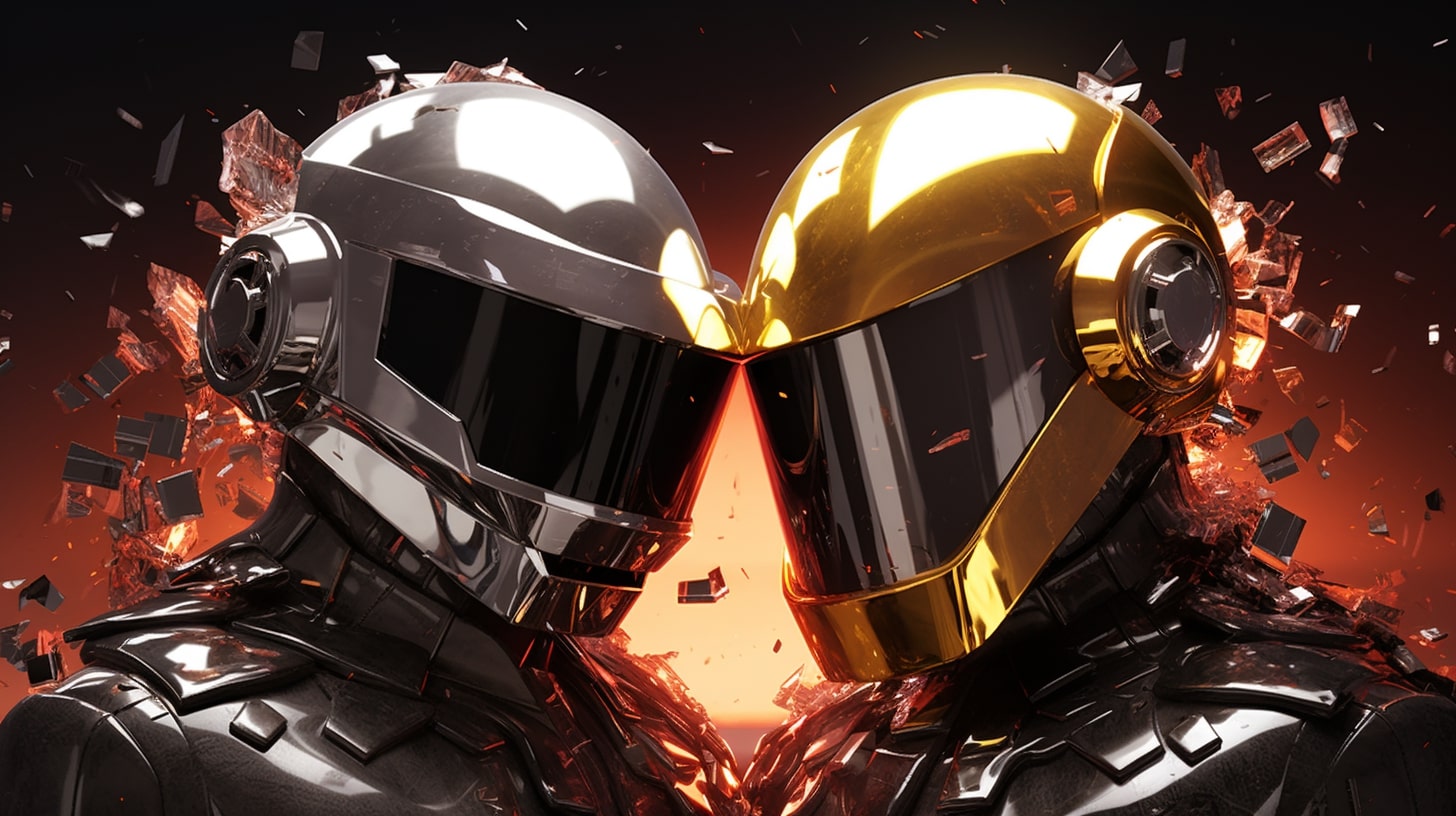Daft Punk, the iconic French electronic music duo, shocked their fans and the music industry when they announced their breakup after an impressive 28-year career. The news left many wondering: why did Daft Punk break up?
By breaking up, Daft Punk has left their fans with a sense of longing and many questions. What will their individual pursuits entail? Will they continue to collaborate in some capacity? This article will answer all these questions and more!
Contents
Daft Punk Broke Up Over AI
You may be surprised to learn that Daft Punk broke up over AI. Former member Thomas Bangalter revealed that their futuristic robot personas and the increasing influence of artificial intelligence drove a wedge between them. Bangalter explained that their iconic robot-like characters, which they had donned for three decades, were a major factor in their decision to disband. He expressed concerns about leaning too far into the world of artificial intelligence, stating that in the world we live in today, being a robot is the last thing he would want to be.
Bangalter acknowledged that their band had blurred the line between reality and fiction, with their on-stage personas becoming a significant part of their identity. However, as time went on, he became increasingly terrified of the relationship between machines and humans. Inspired by the film ‘2001: A Space Odyssey,’ Bangalter viewed their characters as more of an art piece, similar to the experimental approach of artist Marina Abramović. Ultimately, the influence of AI and the fear of losing their human connection led to the breakup of Daft Punk.
Daft Punk Announces Breakup After 28 Years
Symbolically bidding farewell to their fans after nearly three decades, the iconic French electronic duo, known for their enigmatic nature, announced their disbandment through a poignant YouTube video titled ‘Epilogue.’
In their illustrious career, Daft Punk has left an indelible mark on the electronic music scene, revolutionizing the genre and inspiring countless artists. Their impact on electronic music cannot be overstated, as they were pioneers in blending elements of house, techno, and funk to create a unique sound that resonated with audiences worldwide.
Daft Punk’s legacy is one of innovation and creativity. With their four albums and six Grammy awards, they pushed the boundaries of electronic music, constantly reinventing themselves with each release. Their iconic robot personas and futuristic aesthetic became synonymous with their music, captivating audiences and leaving a lasting impression. Their meticulous attention to detail in their production and ability to seamlessly blend different genres set them apart from their peers, solidifying their status as legends in the electronic music world.
The announcement of Daft Punk’s breakup has elicited a wave of emotions from their devoted fanbase. Many fans have expressed their sadness and nostalgia, reminiscing about the duo’s music’s impact on their lives. Social media platforms have been flooded with messages of gratitude and appreciation for the years of joy and inspiration Daft Punk provided.
As fans come to terms with the end of an era, they eagerly await the next chapter in the electronic music landscape, wondering who will carry the torch that Daft Punk has passed on.
Throughout their career, Daft Punk’s sound evolved and transformed, embracing new influences and pushing the boundaries of electronic music. From their early days of infectious, sample-driven tracks to their later work incorporating live instrumentation and collaborations with renowned artists, Daft Punk’s sonic evolution was a testament to their artistic growth and willingness to experiment. Their ability to adapt and innovate kept their music fresh and exciting, paving the way for future generations of electronic musicians.
As for future collaborations, fans can only speculate on what may come next. Daft Punk’s breakup leaves a void in the electronic music landscape but also creates opportunities for new and emerging artists to enter the spotlight. The duo’s influence will undoubtedly continue to inspire and shape the future of electronic music as their legacy lives on in the hearts and minds of musicians and fans alike.
While Daft Punk may no longer be creating music together, their impact and contributions to the genre are eternal.
What is Daft Punk doing now?
Since their split, the members, Thomas Bangalter, and Guy-Manuel de Homem-Christo, have been exploring their individual creative paths.
While they’ve been relatively quiet about their future endeavors, fans can anticipate exciting musical collaborations, solo releases, and the evolution of their sound.
Both Bangalter and de Homem-Christo have a history of collaborating with various artists in the past, and they’ll likely continue to do so in the future. These collaborations may involve musicians from different genres, allowing Daft Punk’s distinctive electronic style to fuse with diverse influences. Such collaborations have the potential to push the boundaries of their sound, creating an exciting and innovative musical landscape.
In addition to collaborations, fans can also expect solo releases from both members. Thomas Bangalter’s recent announcement of his solo album, ‘Mythologies,’ showcases his exploration of orchestral music and his desire to create music without relying on amplification or electricity. This release gives us a glimpse into Bangalter’s creative process and his ability to adapt and evolve as an artist.
Similarly, Guy-Manuel de Homem-Christo may also venture into solo projects, showcasing his unique musical perspective and further expanding the duo’s artistic legacy.
As Daft Punk moves forward, their creative process will undoubtedly continue to evolve. With each new project, they’ll explore new sonic territories, experiment with different production techniques, and find inspiration in unexpected places. Their commitment to pushing the boundaries of electronic music is likely to result in innovative and groundbreaking releases that captivate audiences and leave a lasting impact on the music industry.
While the future plans of Daft Punk remain mysterious and unknown, certainly, their musical journey is far from over. As they navigate the next chapter, fans can look forward to musical collaborations, solo releases, the evolution of their sound, and a continued commitment to pushing the boundaries of electronic music.
The enigmatic duo has left an indelible mark on the industry, and their future endeavors will surely be nothing short of extraordinary.
Daft Punk’s Thomas Bangalter Announces Debut Solo Project
With a heartfelt pivot from the electronic sound that defined Daft Punk, Thomas Bangalter unveils his debut solo project, ‘Mythologies.’ It is a deeply personal and intimate exploration of music that transcends the boundaries of technology and embraces the raw emotion of human creativity.
After decades of creating electronic dance music, Bangalter felt compelled to step away from the amplified, machine-driven sound and return to the simplicity of scoring music with pen and paper. Inspired by his late mother and aunt, who were dancers, and his uncle, a choreographer, Bangalter sought to create a musical experience that didn’t rely on electricity or technology.
‘Mythologies,’ an orchestral album, is a departure from the iconic Daft Punk sound, showcasing Bangalter’s evolution as an artist and his commitment to exploring the human side of music.
Set to be released on Friday, April 7, Mythologies is a testament to Bangalter’s passion for music and his desire to push the boundaries of his creative expression. While Daft Punk was known for their collaborations and futuristic electronic sound, Bangalter’s solo endeavor focuses on his personal journey and the human experience.
As he steps away from the narrative of the robot characters that defined Daft Punk, Bangalter delves into the world of performance art, drawing inspiration from artists like Marina Abramović. He aims to create a stark contrast between humanity and technology, emphasizing the importance of preserving the human element in music creation.
With ‘Mythologies,’ Bangalter invites listeners to join him on a deeply personal and introspective musical journey that showcases his growth as an artist and his commitment to exploring new artistic territories.
Conclusion
In a shocking turn of events, the legendary electronic music duo Daft Punk has officially called it quits after an astounding 28 years in the industry. What is the reason behind their breakup? Artificial Intelligence. Yes, you heard it right.
Daft Punk, known for their futuristic sound and iconic robot personas, has decided to part ways due to the rise of AI technology. It seems that the robots themselves have become obsolete in the face of this advanced form of musical creation. Daft Punk, always at the forefront of innovation, realized that they could no longer compete with the flawless precision and limitless possibilities that AI offers.
This decision marks the end of an era, leaving fans around the world in a state of shock and disbelief. Now, as we bid farewell to Daft Punk, we can’t help but wonder what the future holds for these musical pioneers. Will they continue pushing boundaries individually, or will their legacy be frozen in time?
One thing is for certain, the impact they have had on the music industry is immeasurable. Their infectious beats and electrifying performances have inspired countless artists and shaped the landscape of electronic music as we know it. As we reflect on their incredible journey, we can’t help but feel a sense of gratitude for the gift of Daft Punk.
Their music has transcended boundaries, bringing people together on dance floors worldwide. While their breakup may be a heartbreaking moment for fans, we must remember that their legacy will live on forever. Daft Punk, thank you for the memories, the magic, and the music that will continue to ignite our souls for generations to come.


